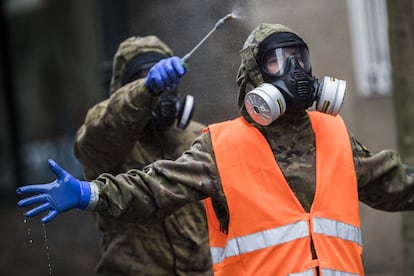Spanish government blames lack of trustworthy data on slow response to pandemic
A report from the National Security Council says that decisions on how to address the coronavirus crisis were made with “partial or out of date information”

The Spanish government has admitted that during the first months of the coronavirus pandemic it was forced to make decisions based on “partial or out of date information” about the real extent of the health crisis, given that the Spanish epidemiological monitoring system was not prepared to process such a volume of data with the speed needed “to correctly take decisions.” That’s according to the last Annual National Security report, which does not specify which flawed decisions it is referring to, but are likely to include allowing the feminist marches for International Women’s Day to go ahead across the country on March 8, 2020, a delay in mandating the use of face masks and the decision not to implement the state of alarm emergency situation until March 14.
This is not the first time that the Spanish government has admitted that it reacted slowly when the pandemic reached the country, but it is the first time that this has been written in a document that has been sent to the lower house of parliament, the Congress of Deputies.
The report blamed Spain’s dependence on external suppliers for essential items, such as face masks and PCR testing capacity, on the “absence of planning and strategic reserves”
The report, which has been approved by the National Security Council – which is made up of the prime minister, the deputy prime ministers, and the ministers for Interior, Defense and Exterior, among others – offers some of the lessons learned from a health crisis that is yet to conclude, albeit falling short of a fully comprehensive critical view of the government’s handling of the situation.
Of particular note in the report was the inability of the country’s healthcare system to detect the scale of the pandemic, and to convey “validated information needed for appropriate decision-making with the speed that was needed.” With a view to the future, the report suggests an essential “upgrade” and a “greater digitization and automation of [epidemiological] monitoring processes,” which are currently in the hands of the country’s 17 autonomous regions.
The 2020 report also calls for the primary healthcare and hospital systems to be strengthened, so that the national health system can respond to a sudden demand for treatment as was seen during the Covid-19 crisis, which has so far seen more than 210,000 people hospitalized and 18,000 require admission in intensive care units (ICUs).
Another factor dealt with by the report was Spain’s dependence on external suppliers for essential items needed to deal with the situation, such as face masks and PCR testing capacity, due to “an absence of planning and strategic reserves.” The text proposes “developing national industrial capacity” to ensure that self-supply is possible in critical situations.
The report also points to the fact that while Spanish researchers are carrying out a “relevant” role in the development of vaccines, with 10 groups at an advanced stage, the country is yet to achieve an “efficient integration” between scientists and industry, to quickly turn advances of the former into tools against the disease.
As was to be expected, epidemics ranked highest among the list of national security risks included in the report. In last year’s edition, they came in 10th. In the opinion of the 200 experts consulted for the text, other key concerns include an increase in cyberattacks, radicalization in the military and the use of drones for terrorist or spying activities, among others.
English version by Simon Hunter.
Tu suscripción se está usando en otro dispositivo
¿Quieres añadir otro usuario a tu suscripción?
Si continúas leyendo en este dispositivo, no se podrá leer en el otro.
FlechaTu suscripción se está usando en otro dispositivo y solo puedes acceder a EL PAÍS desde un dispositivo a la vez.
Si quieres compartir tu cuenta, cambia tu suscripción a la modalidad Premium, así podrás añadir otro usuario. Cada uno accederá con su propia cuenta de email, lo que os permitirá personalizar vuestra experiencia en EL PAÍS.
¿Tienes una suscripción de empresa? Accede aquí para contratar más cuentas.
En el caso de no saber quién está usando tu cuenta, te recomendamos cambiar tu contraseña aquí.
Si decides continuar compartiendo tu cuenta, este mensaje se mostrará en tu dispositivo y en el de la otra persona que está usando tu cuenta de forma indefinida, afectando a tu experiencia de lectura. Puedes consultar aquí los términos y condiciones de la suscripción digital.








































